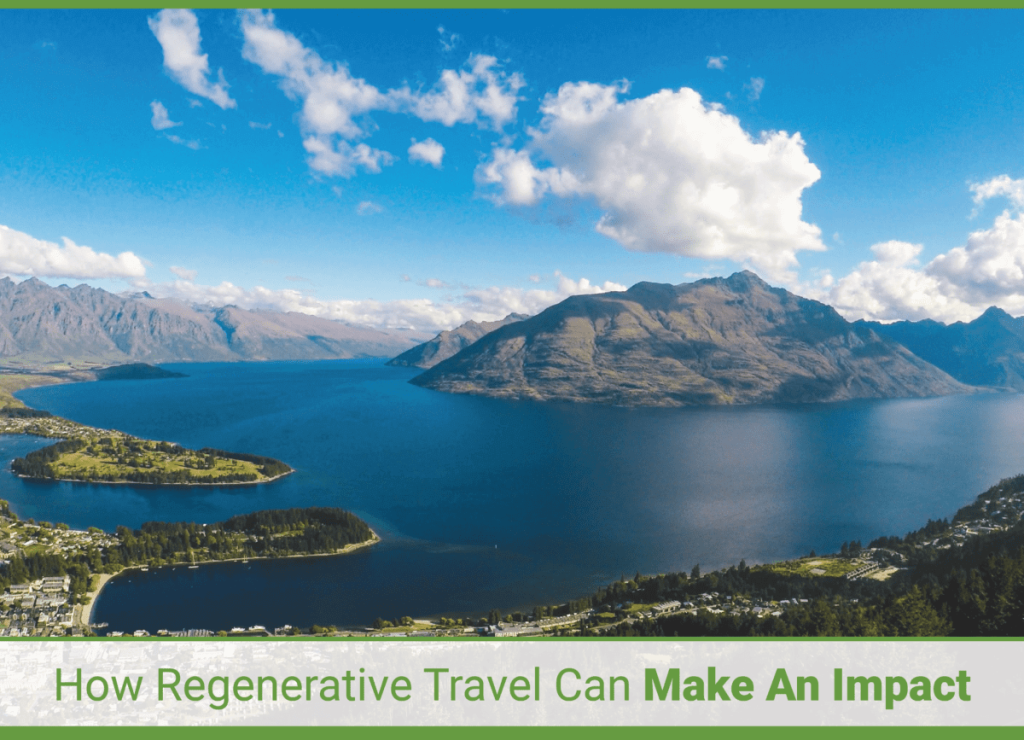

It is important for travelers and non-travelers alike to understand the pressing environmental, social and economic issues associated with tourism. Keeping a blind eye on the impact travel has on global and local environments has reached a tipping point from which our world could struggle to recover. Could regenerative travel practices be the solution? Unity Environmental University offers opportunities to train future regenerative tourism professionals with our degrees in Regenerative Hotel Management and Tourism Destination Management.
We’ve put together some valuable insights on travel and sustainability. Read from the beginning or use the index below.
- What is regenerative travel?
- Why is regenerative travel important?
- Why study regenerative travel at Unity Environmental University?
- What are some of the elements of a regenerative tourism experience?
- Related Jobs
- Want to learn more about regenerative tourism?

Gear your passion for sustainability towards regenerative travel. Learn how our BS in Regenerative Hotel Management or BS in Tourism Destination Management can help.
The Problem
The average person in the US creates almost 5 pounds of waste per day. That’s about 35 pounds of waste per week or just over 1,800 pounds of waste a year. Some of this waste is recycled, but not as much as you might think. In the US, about one third of waste gets recycled; that’s still 1,200 pounds of trash per person going to landfills and incinerators each year.
Now let’s think about waste produced from tourism. Pre-pandemic, 1.5 billion people moved around the world as tourists annually, resulting in 35 million tons of trash. That’s about 12,500 Olympic-sized swimming pools of trash. It’s not just a waste issue either. Trash connects to food and water security, climate change emissions, and justice and equity issues, to name a few pressing socio-environmental challenges facing humanity. If you look at the Sustainable Development Goals, tourism is both part of the problem and part of the solution. Reducing waste production and increasing the tourism industry’s ability to reuse waste is key to Responsible Consumption and Production as outlined in the SDG’s list of goals. Knowledge of sustainable development as it relates to tourism and hospitality will be a critical skill if we are to shift the tourism industry toward a more regenerative future.
Where This Gets Real
Think of your last vacation. What did you do when you arrived at your destination? Sightseeing? Relaxing at the hotel spa? Visiting a museum? Where did you eat? What kind of transportation did you use while there? Every decision, seemingly big or small, has an impact on the local community and on existing natural resources.
When I’m a tourist, I often feel guilty because I know my travel footprint is negatively affecting our natural and social systems. Sure, by spending money in a destination I’m supporting the economy. But is my money actually going back into the local area? Or are a few private individuals or corporations profiting from my trip? Travelers worldwide are becoming increasingly conscious about the impact they make in the places they visit. Many are looking for tourism and hospitality experiences, such as lodging facilities striving to achieve zero waste goals, that are as committed as they are to solving sustainability issues. As a result, a new movement has evolved, regenerative travel, which solidifies comprehensive commitments to sustainable use of resources, waste reduction, ethical engagement with host communities and local cultures, and the minimization of carbon footprints for hotels, lodges and other travel facilities worldwide. As an educator, I am thrilled to be part of programs that will help tourism and hospitality suppliers and visitors, now and in the future, strive toward their regenerative goals to balance natural resource use, social sustainability, corporate social responsibility, and local economic development.
What Is Regenerative Travel?
So just what does regenerative travel mean for travelers and suppliers (like lodging managers, destination planners, and business owners)?
At its core, regenerative travel balances sustainable development, responsible natural and cultural resource use, and economic development. To be successful, it requires actions on both the part of the traveler and destination managers to facilitate sustainable and ethical tourism. It also leverages another dimension – corporate social responsibility (CSR) – the practice of businesses taking action to benefit their communities and accountability for reducing their impact on all aspects of society. In essence, regenerative travel is the process by which tourism and hospitality can have a net positive impact on destinations. This can be done by reducing waste associated with dining, laundry, and cleaning services or by using some tourism profits to fund education and conservation programs within the destination.
By adopting regenerative principles, travel can be a positive force for change that connects travelers to socially and environmentally ethical tourism and hospitality experiences. Examples of regenerative travel and hospitality experiences can include climate-friendly boutique hotels, tourists participating in a volunteer beach cleanup while on vacation, tourism and hospitality businesses using some of their profits to provide education for locals, or travelers learning about local ecosystems and cultures on a wildlife safari led by local guides. In short, regenerative travel is about preserving resources so that natural elements are regenerated versus plundered by overuse, minimizing negative impacts from tourism while maximizing benefits to people and the planet.
Careers in regenerative travel are growing rapidly as hotels and other hospitality providers look to reduce waste, use more renewable energy, and involve their guests in responsible actions that give back rather than take more away from local ecosystems. At the same time, tourism providers and destination managers are developing regenerative attractions and experiences that build on trends like slow travel, e.g., train vs. plane, bike vs. car, and local food movements.
Why Is Regenerative Travel Important?
Regenerative travel is a relatively new, innovative movement within tourism and hospitality. Regardless of their destinations and itineraries, travelers are increasingly looking for more environmentally and socially sustainable tourism and hospitality options. In addition to serving visitor needs, regenerative travel helps humanity achieve pressing Sustainable Development Goals, such as action on climate change, circular waste management, and job growth. By adopting regenerative principles, the tourism and hospitality industry can lead sustainable development initiatives worldwide while still providing high quality travel experiences.
Why Study Regenerative Travel At Unity Environmental University?
Unity is America’s Environmental University, fully dedicated to delivering actionable degrees in sustainability and environmental sciences. Our mission is to develop a green workforce for global businesses across industries.
Environmental stewardship, social sustainability, and corporate citizenship are at the heart of Unity Environmental University. Students in our tourism and hospitality programs will draw from a variety of knowledge areas, including business, tourism and hospitality, social justice, sustainable development, and ecology. As you study tourism and hospitality, you’ll take a deep dive into regenerative practices to be ready to help shift the travel industry toward a more regenerative future.
You’ll graduate with professional skills needed by hiring managers.
Our courses are closely tied to professional skill development. You’ll graduate with the content knowledge you need to work in tourism and hospitality, as well as the skills desired by employers. As an example, students will learn about regenerative travel experiences and develop their own strategic plan to incorporate regenerative principles into a business idea.
Study from anywhere in the world.
As an online asynchronous learner, you will have the freedom to travel personally while completing your coursework, adding to your perspective on regenerative travel firsthand. Whether you travel while studying or not, this program will help you see the impact of travelers on many different types of communities from resorts to off-the-road towns and villages. Either way, you will complete this program with a strong understanding of the breadth of tourism and hospitality industries worldwide, and with an ability to apply the lessons of sustainability to any location in which you might work.
Related Jobs
| Job Types | Media Salary | Growth |
|---|---|---|
Lodging Managers plan, direct, or coordinate activities of an organization or department that provides lodging and other accommodations. Examples of these roles include: Bed and Breakfast Innkeeper, Front Desk Manager, Front Office Manager, Guest Relations Manager, Hotel Manager, Resort Manager. | $61k | +8% |
| Project Management Specialists analyze and coordinate the schedule, timeline, procurement, staffing, and budget of a product or service on a per project basis. Project Management Specialists will lead and guide the work of technical staff and may serve as a point of contact for the client or customer. | $95k | +8% |
| Sustainability Specialists address organizational sustainability issues, such as waste stream management, green building practices, and green procurement plans. Examples of these roles include: Energy and Sustainability Strategic Advisor, Sustainability Coordinator, Sustainable Design Consultant. | %75k | +4% |
Want To Learn More About Regenerative Tourism?
Learn more about the impact you can have when you pursue a degree in regenerative tourism:
- ROOTED — A solutions platform at the intersection of sustainable tourism, storytelling, and social impact.
- What are the benefits of regenerative travel & tourism?
- Regenerative Tourism – A holiday mind shift beyond sustainability
- Hawai‘i’s Regenerative Tourism Movement
About Unity Environmental University
At Unity, sustainability isn’t a buzzword. It’s the foundation of our entire approach, and has been for more than 50 years.
We apply sustainability principles to everything we do, from our properties around the State of Maine, to our online degrees offered to students everywhere, to our enrichment experiences and entrepreneurial endeavors at locations from northern Maine to Arizona to Brazil.
Engage with Unity Environmental University and you’ll start to ask tough questions, challenge the status quo, and envision new possibilities. If taking the lead in creating a more sustainable future sounds like the future you want, we can make it happen.
Additional Resources
Blog written by Dr. Lydia Horne



